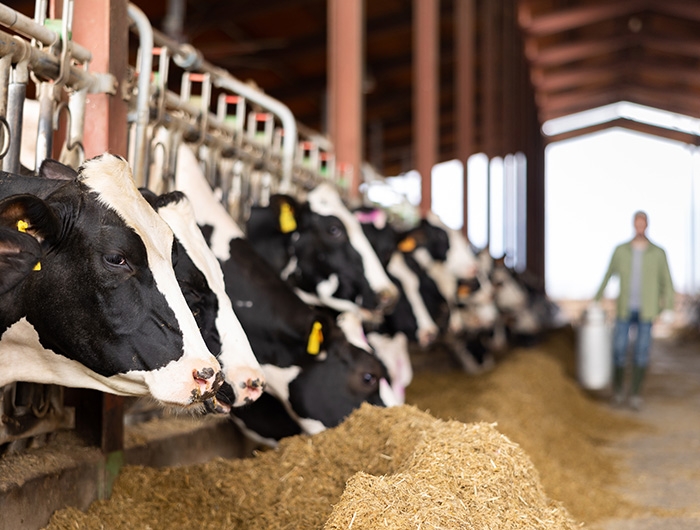Genetically engineered animals to be regulated by FDA

JackF - stock.adobe.com
In May 2024, the FDA released guidance stating in effect that the agency will primarily be responsible for regulating genetically engineered animals. Here’s what to know about gene-edited animals, labeling of GMO products, and what this means for consumers.
Foods from genetically engineered animals are now on the market
Humans have been shaping the genetics of plants and animals for millennia. Through selective breeding, humans choose to mate plants or animals possessing certain favorable traits to promote those traits in the population. While this technique only incrementally changes a population’s traits, over many generations it can lead to drastic changes.
However, modern genetic engineering technologies allow scientists to directly induce targeted changes in an organism’s DNA, allowing for much quicker and more precise changes in population-level traits. In recent decades, scientists have used genetic engineering to insert genes (i.e., portions of DNA) from one organism into another. And with newer gene-editing technologies such as CRISPR, scientists can even make narrowly targeted edits in a plant or animal’s DNA.
Food products derived from genetically modified plants have been sold in the US for decades. For example, the great majority of corn, soybeans, and cotton currently grown in the US are genetically modified. However, it is only within the last few years that genetically modified animals have been approved for commercial use. These animals are bioengineered to possess some desirable quality, such as faster growth or increased durability in response to environmental hazards.
In 2015, the FDA approved the first genetically engineered animal for commercial use in the US: AquAdvantage Salmon, which is a salmon modified to reach maturity more quickly than standard salmon. Since then, the FDA has approved other gene-edited animals for commercial purposes, including pigs that are less likely to induce allergic reactions that some humans have as a result of tick-borne illness. Other gene-edited animals are still in development, such as shorter-haired cows that are better able to withstand rising temperatures due to climate change.
But until recently, there was some controversy over which federal agency would be responsible for regulating genetically engineered animals.
The FDA announced that it will regulate genetically engineered animals
The FDA announced in May 2024 that the agency will lead the charge on regulation of animals with intentional genomic alterations (IGAs). In its guidance, the FDA stated that the agency will consult with the USDA, but that the FDA will primarily be in charge of regulating these animals. Newly developed gene-edited animals will need to go through an oversight process, in which the agency will assess potential risks, before they can enter the market. Products that represent limited risk will receive proportionately less oversight.
For the past several years, it was unclear which agency, the FDA or the USDA, would regulate genetically engineered animals. CSPI argued in two op-eds, appearing in The Hill and STAT, that the FDA should be the agency to regulate these animals. For one, the FDA’s mandate includes public health and animal health, while the USDA’s mandate includes promoting the US agricultural industry and does not center human health. Additionally, while the USDA has oversight over some agricultural animals—poultry, cattle, horses, swine, and goats—the FDA has authority over all others, so a system not centered on the FDA would be inefficient. Finally, the FDA has pre-existing experience in regulating genetically engineered animals, as well as the scientific resources and regulatory framework needed to effectively tackle regulation of these animals.
As CSPI President Dr. Peter G. Lurie stated, “The FDA’s scientific expertise and human and animal health mandates make it the appropriate agency to maximize the benefits and minimize the risks of the next generation of genetically altered animals.”
Do GMO foods need to be labeled?
Under federal law, manufacturers must disclose when their food products contain certain genetically modified ingredients. In July 2016, President Obama signed the National Bioengineered Food Disclosure Law (NBFDL), requiring food manufacturers to disclose the presence of bioengineered foods and ingredients.
Federal rules now require most foods and ingredients that have modified DNA to make a disclosure. The disclosure may be on the package or may require consumers to go to a website or make a telephone call. However, there are several exemptions to these disclosure rules, including for restaurant foods, small-scale manufacturers, and animals fed bioengineered crops. In addition, the disclosure will tell you that there are bioengineered ingredients but will not necessarily tell you which ingredients are bioengineered.
Moreover, not all animal-derived products are covered under the NBFDL. The rules do not apply to products that list meat, poultry, or eggs as their first ingredient (or their second ingredient after water, stock, or broth) because those product labels are regulated by other USDA statutes.
CSPI is working to create a safer and more transparent food system
CSPI will continue to educate policymakers and the public about the benefits and risks associated with genetically engineered crops and animals. We will also continue to advocate for strong federal regulation of genetically engineered food products and press the biotechnology industry and farmers to use genetically engineered crops and animals in a sustainable manner.
Support CSPI today
As a nonprofit organization that takes no donations from industry or government, CSPI relies on the support of donors to continue our work in securing a safe, nutritious, and transparent food system. Every donation—no matter how small—helps CSPI continue improving food access, removing harmful additives, strengthening food safety, conducting and reviewing research, and reforming food labeling.
Please support CSPI today, and consider contributing monthly. Thank you.

Stirring the Pot
Join the fight for safer, healthier food
Sign up to receive action alerts and opportunities to support our work in Stirring the Pot, our monthly newsletter roundup.

